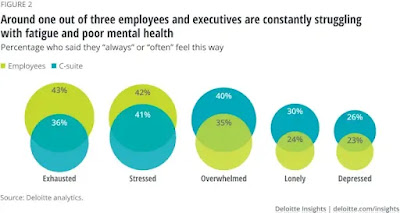"The greatest wealth is health."
--Virgil
One of the more significant life changes in the past 36 months is how people think about work.
"The pandemic changed a lot of things--probably permanently--about the relationship between people and the way they view work. This intimately ties into the job stress--mental health link," says Chester Spell. Ph.D., professor of management at Rutgers University.
Dr. Spell's observation is certainly accurate for workers under 40.
Gallup's State of the Global Workplace report underscores the negative impact from 2020 now carried over into subsequent years.
"Younger employees (those under 40) have more stress and anger, lower employee engagement, and lower well-being than older employees," writes Ryan Pendell. "Leaders, particularly those who come from older generations, need to recognize that well-being support looks different for different stages of life," he adds.
 |
| (C) PMHC |
To examine well-being, we turn to a comprehensive study conducted by Deloitte and Workplace Intelligence. The research extended to four countries: the United States (57% of respondents), United Kingdom (14%), Canada (14%), and Australia (14%). Fielded in February 2022, the survey targeted executives and employees between 18 and 76 years of age, working full-time.
There were 2,100 respondents, 1,050 C-suite, and 1,050 employees.
The results of the Deloitte survey reflect a younger global workforce, 63% under 45 by 2025, and pick up on attitudes found in the Gallup study.
Key findings
Well-being is high on the list of corporate priorities.
"While the pandemic brought worker safety in the spotlight, there's also been an increased focus on the overall poor state of workforce well-being and the role that organizations play in determining the quality of life for employees and their families," the report concludes.
It may be stating the obvious, but the authors note that work often works against well-being.
How can C-suite leaders improve their employees and their well-being, something millennials and Gen Z desperately want from employers?
And how would any company-sponsored wellness programs include remote or hybrid workers?
Is a new direction possible?
Rethinking and executing a new organizational wellness initiative will take time--and hard work. Unfortunately, there are few practices to measure against as this period is filled with new behaviors.
The Deloitte study confirms that employees and the C-suite struggle to prioritize their well-being. But, again, the data show work is primarily to blame. The problems include outdated work schedules, having to be "always on," substandard wages and benefits, and the idea of sacrificing health and personal lives for their job.
Closed offices and work-from-home situations were not highlighted.
"The pandemic has worsened everyone's health, but executives don't realize how much their employees are struggling," the report states.
Deloitte says, "Fatigue and mental health issues show up among employees and executives. Well-being, or the lack of it, doesn't discriminate among rank."
Optimism is a character trait in higher positions. For example, eight of 10 global executives believe their people are thriving in all aspects of their well-being. Yet, the four-country study shows that while 57% of employees consider quitting for a more supported job, nearly seven out of 10 executives think about doing the same.
So much for management positivity.
Where does the process begin?
A corporate culture of well-being begins at the top but requires broad participation. Even with prevalent mental health issues, everyone has the potential to contribute to institutional wellness through personal wellness.
"Taking control of our thoughts and behavior is key to protecting our mental health. One of the central tenets of cognitive behavioral therapy is the belief that it is often not external events themselves but our interpretation of those events that lead to our difficulties," writes Kirsty Miller, Ph.D., a psychologist based in central Scotland.
"This way of thinking is empowering as it returns control to the individual," Dr. Miller emphasizes.
It's encouraging that young leaders are showing the way.
Notably, 80% of the Deloitte respondents agreed that workers are likelier to be healthy when executives are healthy. Personal well-being is, therefore, a viable path to corporate well-being.
How important is that finding?
Best-selling author, Patrick Lencioni, summarizes this way:
"Organizational health will one day surpass all other disciplines in business as the greatest opportunity for improvement and competitive advantage."
Strategist.com
© Bredholt & Co.



